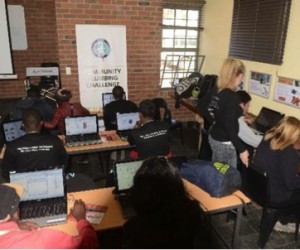The up-skilling of artisans and plumbers is high on the national agenda in South Africa. Townships, such as Diepsloot, with poor service delivery and inadequate infrastructure, need effective and sustainable sanitation facilities to promote health and improve socio-economic conditions and, an unacceptably high unemployed youth population needs work. Effective skills training programmes are more important than ever, not only to accelerate economic growth, but to ensure that shoddy workmanship doesn’t compromise the health of hundreds of thousands of people.
Rand Water has indeed identified a programme (The War on Leaks campaign) to train 15 000 unemployed youth to be plumbers and sanitation workers.
The Community Plumbing Challenge (CPC), which took place in Diepsloot between the 9th and 15th of July, complements government’s efforts to train young plumbers. For some time, the communal toilet and washing facilities in the area have been a serious concern for residents. Local residents complain that drains keep blocking, affecting water supply, with sewage running abundantly in the streets. Some don’t want to use the toilets, shared by up to 45 households, because they are dirty and often, broken.
During the competition, eight defunct communal toilets, which had been plucked out of the ground in Diepsloot Extension 1, were worked on, using advanced cloud-based design technology, by four international student teams (representing Australia, India, United States and South Africa). The teams then collaborated to test their new designs, supporting Diepsloot plumbing organisation WASSUP (Water, Amenities, Sanitation Services Upgrade Programme) in reinstalling and reconnecting these communal toilets for local Diepsloot residents.
Local plumbers have had poor access to technology, but have the opportunity to use Fusion 360 by Autodesk. This software has not been used before in grassroots plumbing initiatives and allows teams to connect with and build on, each other’s designs long after the competition is over. Knowledge sharing continues, with the development of designs occurring in real time with live interaction, no matter where in the world plumbers are. The software is simple to use, and Autodesk offers on-the-ground support for plumbers on an ongoing basis.
“What’s significant about the collaborative nature of the project is that it simulates a commercial project, where multiple stakeholders contribute to the design and implementation of infrastructure. This allows students to see what it’s like in a commercial environment,” said Lisa Taylor of Educad, Autodesk’s educational partner.
“We wanted to ensure that young people within the Diepsloot community had the opportunity to engage with the design element of the activities. As such, we held a Fusion 360 training camp at the Wot-If centre for over 60 Diepsloot residents, to not only ensure they played a critical role in the CPC but also to inspire them to see firsthand the opportunities available to them through the power of design,” said Matthew Bell, Global Strategic Partnerships Manager from Autodesk.
An additional element Autodesk brought to the CPC was the Global Classroom academy.autodesk.com/global-classroom which is an online platform to enable people around the world to not only follow the daily activities during the CPC, but also engage directly in the design challenges being faced by the teams in Diepsloot. Design is at its most impactful when it is carried out collaboratively and the Global Classroom offers the perfect platform for this, whilst educating about the importance of considering elements such as design for impact and sustainable design.
Johannesburg Water has seen the benefits of digital design software, and WASSUP’s relationship with the entity has been boosted, improving dialogue around service delivery.






